Ciné Gael Montréal Irish Film Series 2018 ...our 26th
Concordia University, 1400 de Maisonneuve West, at 7:15 PM, unless otherwise indicated.
Ireland is celebrating 2018 as the year of the Gaelic language - the year of Irish.
Each Ciné Gael season we always work to schedule features and short films in Gaelic. This practice started in 1995 with our first film in Gaelic, The Bishop's Story; two years later we screened Bob Quinn's film Poitin, and we were in the groove.
Click on either of the two images on our banner to learn about the 2018 Irish Language Celebrations (Blain na Gaeilge) and about Conradh na Gaeilge, the Gaelic League founded in 1893.
Sign up if you'd like to be on our email list and get our latest updates. Visit our Members' page to read how to enrol as a member for our 2018 Season, which costs $80 this year.
Our programmers have been scanning film fleadh catalogues
and soliciting recommendations and screeners from our
film and filmmaker contacts in Ireland, and especially from IFI,
the Irish Film Institute
![]() .
.
94 min - Dir: Nick Hamm; Written By: Colin Bateman with: Timothy Spall, Colm Meaney, John Hurt, Freddie Highmore, Toby Stephens and Catherine McCormack
 “It’s a celebration, by two splendid actors, of the art of political theater.”
- Variety [Owen Glieberman]
“It’s a celebration, by two splendid actors, of the art of political theater.”
- Variety [Owen Glieberman]
The Journey had its world premiere at the Venice Film Festival, followed by its North American premiere at the Toronto Film Festival. - TIFF [Dave McNary]
The movie focuses on the improbable friendship between Martin McGuinness (played by Meaney) and Ian Paisley (Spall) in a story that follows the two Northern Ireland political titans after the signing of the breakthrough St. Andrews Agreement in 2006.
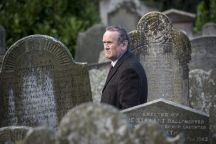 The Journey is the gripping account of how two men from opposite sides of the political spectrum
came together to change the course of history. In 2006, amid the decades-long conflict in Northern Ireland, representatives
from the two warring factions meet for negotiations. In one corner is Ian Paisley (Timothy Spall), the deeply conservative British loyalist;
in the other is Martin McGuinness (Colm Meaney), a former Irish Republican Army leader who has devoted his life
to the cause of Irish reunification.
The Journey is the gripping account of how two men from opposite sides of the political spectrum
came together to change the course of history. In 2006, amid the decades-long conflict in Northern Ireland, representatives
from the two warring factions meet for negotiations. In one corner is Ian Paisley (Timothy Spall), the deeply conservative British loyalist;
in the other is Martin McGuinness (Colm Meaney), a former Irish Republican Army leader who has devoted his life
to the cause of Irish reunification.
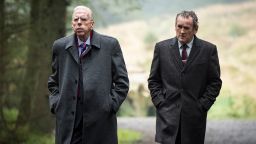 Over the course of an impromptu, detour-filled car ride through the Scottish countryside, each begins to see the other less as an enemy,
and more as an individual - a breakthrough that promises to at last bring peace to the troubled region. Driven by two virtuoso central
performances and co-starring John Hurt, Freddie Highmore and Toby Stephens, The Journey,
an IFC Films theatrical release, is a relevant reminder of how simple humanity can overcome political division.
Over the course of an impromptu, detour-filled car ride through the Scottish countryside, each begins to see the other less as an enemy,
and more as an individual - a breakthrough that promises to at last bring peace to the troubled region. Driven by two virtuoso central
performances and co-starring John Hurt, Freddie Highmore and Toby Stephens, The Journey,
an IFC Films theatrical release, is a relevant reminder of how simple humanity can overcome political division.
90 min - Dir: James Demo with: Padraig O'Malley
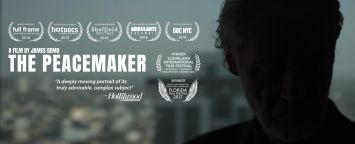 "A deeply moving portrait of its truly admirable, complex subject"
Hollywood Reporter
"A deeply moving portrait of its truly admirable, complex subject"
Hollywood Reporter
“Padraig O'Malley makes peace for others, finds little for himself” Boston Globe
In the heart of the world’s most intractable conflicts, Padraig O’Malley brokers peace using unorthodox methods and dogged determination.
With no formal training in conflict resolution, he convened Northern Ireland’s key peace conferences at the age of 33.
His uncanny talent lies precisely where United Nations envoys and diplomats fail—gaining a person’s trust.
Face to face with dogmatic leaders, O’Malley can get them to tell their stories
 For five years, filmmaker James Demo follows the peacemaker through crisis zones from Nigeria to Iraq, and discovers
an even more fractious frontline—O’Malley’s personal life. The man who creates meaningful connections for a living returns home
to an empty apartment.
For five years, filmmaker James Demo follows the peacemaker through crisis zones from Nigeria to Iraq, and discovers
an even more fractious frontline—O’Malley’s personal life. The man who creates meaningful connections for a living returns home
to an empty apartment.
A recovering alcoholic, O’Malley’s relationships with partners and an adopted daughter bear the scars of addiction to the bottle and work. Struggling against time, his demons and an exhausting career, can this formidable character find salvation for both the world and himself?
 The first half chronicles O’Malley’s major accomplishments in exceptional form, and Demo gets a lot of background material
and context by following his subject. Then, the second half of the film becomes something deeply personal and almost heartbreakingly poetic
as O’Malley has to come to terms with his own failing health.
- Toronto Film Scene
The first half chronicles O’Malley’s major accomplishments in exceptional form, and Demo gets a lot of background material
and context by following his subject. Then, the second half of the film becomes something deeply personal and almost heartbreakingly poetic
as O’Malley has to come to terms with his own failing health.
- Toronto Film Scene
Peace is not the absence of gunfire, O’Malley made clear. “In terms of conflict resolution, reconciliation is the most important thing — when the guns fall that is only just the beginning — all reconciliation must be inter-generational,” he said. Padraig O’Malley
87 min - Dir: Len Collin with: Christian O'Reilly, Kieran Coppinger, Charlene Kelly.
 "There's a wonderful warmth and directness to this movie."
- Guardian [Peter Bradshaw]
"There's a wonderful warmth and directness to this movie."
- Guardian [Peter Bradshaw]
"This deft delight resolutely refuses to patronise the performers or the audience. It has a sincerity, wit and compassion that recalls Justin Edgar's 2005 short film Special People." - Radio Times [David Parkinson]
Movies can have big impacts on people's lives, but not many films can say they've actually changed the law.
 Enter Irish film Sanctuary, about a couple who want to be together but face huge obstacles.
The film's protagonists, Larry and Sophie, have Down Syndrome and severe epilepsy, respectively.
(The film's entire cast is made up of actors with mental disabilities.) And since they both have mental disabilities,
under Irish law, they're not allowed to have sex unless they're married — at least that was the case when this fictional film
was shot a few years ago.
Enter Irish film Sanctuary, about a couple who want to be together but face huge obstacles.
The film's protagonists, Larry and Sophie, have Down Syndrome and severe epilepsy, respectively.
(The film's entire cast is made up of actors with mental disabilities.) And since they both have mental disabilities,
under Irish law, they're not allowed to have sex unless they're married — at least that was the case when this fictional film
was shot a few years ago.
On Feb. 14, 2017, that law was changed thanks to the work of Inclusion Ireland and other lobbyists. The film was cited as one of the reasons behind that decision.
 "When you look at Sanctuary, it's the first time that it's a story told about them,
by them," director Len Collin says, of representing mental disabilities in film. Colin adds that the film industry is still
far from breaking through with stories that reflect people and actors with disabilities, but that "it always takes someone to make
the first film, and maybe this is the first film that's going to crossover to the mainstream."
"When you look at Sanctuary, it's the first time that it's a story told about them,
by them," director Len Collin says, of representing mental disabilities in film. Colin adds that the film industry is still
far from breaking through with stories that reflect people and actors with disabilities, but that "it always takes someone to make
the first film, and maybe this is the first film that's going to crossover to the mainstream."
[ Screened at the ReelAbilities Film Festival in Toronto ]
CBC
[Tom Power and Jean Kim on Q]
81 min - Dir: Alex Fegan with 30 of Ireland’s oldest citizens
 "Older Than Ireland is a landmark documentary that examines
what it means to have lived one hundred years in Ireland, as seen through the eyes of its oldest citizens."
Rotten Tomatoes
"Older Than Ireland is a landmark documentary that examines
what it means to have lived one hundred years in Ireland, as seen through the eyes of its oldest citizens."
Rotten Tomatoes
"A charming, moving and over-too-soon portrait of a country, and of what it means to have a longer than expected life." - Seattle Times [ Moira MacDonald]
"Fegan may not unearth why the Emerald Isle is home to so many spirited centenarians, but their presence makes for a lovely and inspiring experience in the enjoyable documentary Older Than Ireland" - Los Angeles Times [ Gary Goldstein]
 Directed by Alex Fegan (The Irish Pub),
Older Than Ireland is a landmark documentary that tells the story of a hundred years of a life
as seen through the eyes of thirty Irish men and women aged 100 or over. Often funny and at times poignant,
the film explores each centenarian’s journey, from their birth at the dawn of Irish independence to their life as a centenarian
in modern day Ireland.
Directed by Alex Fegan (The Irish Pub),
Older Than Ireland is a landmark documentary that tells the story of a hundred years of a life
as seen through the eyes of thirty Irish men and women aged 100 or over. Often funny and at times poignant,
the film explores each centenarian’s journey, from their birth at the dawn of Irish independence to their life as a centenarian
in modern day Ireland.
 Reflecting on such key events as the day they got their first pair of shoes, the thrill of their first kiss,
from the magic of their wedding day to the tragic loss of their loved ones, these centenarians have lived through it all.
Having witnessed a century of immense social, political and technological change each centenarian has a unique perspective
on life and its true meaning.
Reflecting on such key events as the day they got their first pair of shoes, the thrill of their first kiss,
from the magic of their wedding day to the tragic loss of their loved ones, these centenarians have lived through it all.
Having witnessed a century of immense social, political and technological change each centenarian has a unique perspective
on life and its true meaning.
From the oldest Irish person ever on record, 113-year-old Kathleen Snavely to Ireland’s oldest man, 108-year-old Luke Dolan we meet a colourful cast of characters, from all walks of life, from the four corners of Ireland. These centenarians are our living history and these are their extraordinary stories.
The first runner-up was "My Ireland" by Myles O'Reilly with the poetry of Stephen James Smith
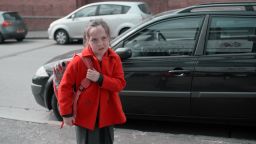 Saving Santa (2017)
(17 mins, drama) Dir: Keith O’Grady
with: Eva Morris, Gordon Fulton, and Paul Ronan
Saving Santa (2017)
(17 mins, drama) Dir: Keith O’Grady
with: Eva Morris, Gordon Fulton, and Paul Ronan
A little girl by the name of Ruby Fair is still dealing with her mother's death when she comes across a seemingly destitute man in the street.
He's a street drinker who bears a striking resemblance to Santa Claus. Despite his protestations, she takes great comfort in helping him.
Best Short film – Chico Shorts Festival, USA
Best Short film – Indie Film Awards, California
Best Irish Short – Disappear Here Film Festival, Co. Donegal, Ireland
Best International Short – Moving Pictures Festival of Antwerp, Belgium
 An Béal Bocht (The Poor Mouth) (2017)
(30 mins, satire, Gaelic) ;
Dir: Tom Collins and animator, John McCloskey
with: Tommy Tiernan, Owen McDonnell, Donncha Crowley,
Bob Quinn, Seán Mistéal, Micheal O'Meallaigh.
An Béal Bocht (The Poor Mouth) (2017)
(30 mins, satire, Gaelic) ;
Dir: Tom Collins and animator, John McCloskey
with: Tommy Tiernan, Owen McDonnell, Donncha Crowley,
Bob Quinn, Seán Mistéal, Micheal O'Meallaigh.
An animated adaptation of Flann O’Brien’s only novel written in Irish under the pseudonym of Myles Na gCopaleen.
It is a biting satire of the life story of a young Gael reflecting on his life from Sligo Gaol.
It is widely regarded as one of the greatest Irish-language novels of the 20th century.
Best Animation – Foyle Film Festival
Best First Animation – Galway Film Fleadh
Don Quijote Award for Animation – Galway Film Fleadh
 Oh Brother (2017)
(15 mins, drama) Dir: Mia Mullarkey; writer: Eddie Mullarkey
with: Jarlath Tivnan, Eddie Mullarkey, Maria Lopez,
Annie Ryan, Dorota Konczewska, Eilish McCarthy.
Oh Brother (2017)
(15 mins, drama) Dir: Mia Mullarkey; writer: Eddie Mullarkey
with: Jarlath Tivnan, Eddie Mullarkey, Maria Lopez,
Annie Ryan, Dorota Konczewska, Eilish McCarthy.
Fergal has Asperger’s Syndrome and lives a lonely life. From a mix of guilt and fraternal love, his brother Sean gets pulled
into helping Fergal down an unseemly path.
Best Actor – Wexford Film Festival
Pinnacle Award – Elevation Indie Film Awards
Grand Jury Award – Monkey Bread Tree Film Awards
 Tit for Tatt (2017)
(20 mins, documentary) Dir: Mairéad Ní Thréinir
Tit for Tatt (2017)
(20 mins, documentary) Dir: Mairéad Ní Thréinir
This short documentary follows the experiences of two cancer survivors who were inspired to mark their battles by getting tattoos
on their surgery scars.
Best Short Documentary – Galway Film Fleadh
 Wave (2014)
(14 mins, drama) Dir: Benjamin Cleary & T.J. O'Grady Peyton
with: O'Grady Peyton in lead
Wave (2014)
(14 mins, drama) Dir: Benjamin Cleary & T.J. O'Grady Peyton
with: O'Grady Peyton in lead
A man wakes from a coma speaking a fully formed but unrecognizable language, baffling linguistic experts from around the globe.
Best Short Film – Irish Film and Television Awards
Best Short Drama – Galway Film Fleadh
 Little Flower (2016)
(3 mins, animation) Dir: Brigette Heffernan
Little Flower (2016)
(3 mins, animation) Dir: Brigette Heffernan
Tired of being stuck in one place, a small flower has the impossible dream of flying away.
Though the other flowers think her dream is silly she won't be deterred. After a series of failed attempts
she begins to lose hope until she discovers something that may change things.
Best Animation – Socchi International Film Festival
Best Animation – Fingal Film Festival
Best Animation – Dublin International Short Film and Music Festival
 My Ireland (2017)
(12 mins, poetic and musical imagery) Dir: Myles O'Reilly
My Ireland (2017)
(12 mins, poetic and musical imagery) Dir: Myles O'Reilly
My Ireland is a poem by renowned Irish poet Stephen James Smith, narrated over visuals of Ireland filmed by Myles O'Reilly
with music produced, recorded and mixed by Conor O'Brien and featuring performances
from Colm Mac Con Iomre, Siant Sister, Ye Vagabonds, Loah and Inni-K.
Best Editing – Fastnet Film Festival
Best Art House – Fastnet Film Festival
92 min - Dir: Mark O'Connor; Writer:John Connors with: John Connors, Fionn Walton, Damien Dempsey, Kierston Wareing, Gemma-Leah Devereux, Kyle Bradley Donaldson and Lydia McGuinness
 "Mark O'Connor's film isn't subtle, but it's made with swagger and its antihero fits the bill as a certain kind of crime-drama archetype:
overambitious, stupid and doomed, he nonetheless has a crude poignancy."
Sunday Times (UK) [
Edward Porter]
"Mark O'Connor's film isn't subtle, but it's made with swagger and its antihero fits the bill as a certain kind of crime-drama archetype:
overambitious, stupid and doomed, he nonetheless has a crude poignancy."
Sunday Times (UK) [
Edward Porter]
"The film is crackingly done, with a bleak humour when needed and a black savagery when not." Financial Times [ Nigel Andrews]
"Salty, funny, and enlivened by some fantastic Dublin rap music, Cardboard Gangsters has a rare authenticity in terms of its subject matter and location." Irish Independent [ Paul Whitington]
In Cardboard Gangsters is O’Connor’s most complete film yet.
 The picture, set among small-time criminals in Darndale, has admirable kinetic sweep and a keen sense of the absurdities of city life.
The picture does lack story and structure. But it is so enjoyable on a scene-by-scene basis that it proves hard to care.
The picture, set among small-time criminals in Darndale, has admirable kinetic sweep and a keen sense of the absurdities of city life.
The picture does lack story and structure. But it is so enjoyable on a scene-by-scene basis that it proves hard to care.
 The charismatic, unshakeable John Connors – who also takes a screenplay credit –
plays troubled young operator Jay. He has his share of problems. Hoodlum landlords are threatening to throw his ma out of her house.
His girlfriend may be pregnant. The social welfare people are threatening to stop his dole because he does the odd gig as a DJ.
Soon he and his pals are contemplating an assault on the upper rungs of the ladder. They rob an off-licence.
They move from flogging weed to shifting heroin. We’ve seen enough crime movies to suspect their path will not be unimpeded.
The charismatic, unshakeable John Connors – who also takes a screenplay credit –
plays troubled young operator Jay. He has his share of problems. Hoodlum landlords are threatening to throw his ma out of her house.
His girlfriend may be pregnant. The social welfare people are threatening to stop his dole because he does the odd gig as a DJ.
Soon he and his pals are contemplating an assault on the upper rungs of the ladder. They rob an off-licence.
They move from flogging weed to shifting heroin. We’ve seen enough crime movies to suspect their path will not be unimpeded.
The star of the show is Michael Lavelle’s camera. O’Connor has talked him into long shots that follow the characters all the way down the street and into busy houses. He sets the scene at a party by taking us all around the action in one enormously busy take. Jay’s DJ set buzzes with delicious, oily energy. The punch-ups and pursuits are choreographed with an invention that stops just short of inappropriate relish. The film is exciting, but it is unlikely to inspire much copycat behaviour. Irish Times [ Donald Clarke]
91 min - Dir: James Erskine; writers: Marie Jones, James Erskine with: Richard Dormer, Conleth Hill, John Hannah, Nico Mirallegro, Art Parkinson, Bronagh Gallagher
 "As satisfying as scoring a thirty-yard screamer.” –
Total Film
"As satisfying as scoring a thirty-yard screamer.” –
Total Film
"A charming celebration of the beautiful game.” – The List [ Nikki Baughan]
"Exceedingly enjoyable with some great actors, most from Game of Thrones, tells the heroic tale of Northern Ireland's performance in the 1986 World Cup. Jackie Fullerton is the main tale but you cannot help but love the underdog vibe and bonus points for featuring Nottingham in the story too and many references to Nottingham Forest.” – Ian Walker
 In November 1985, the troubled streets of Belfast are torn up by rioting yet again.
In amongst the angry mob, we find nine year old Tommy, nonchalantly dribbling a ball through the insanity.
In November 1985, the troubled streets of Belfast are torn up by rioting yet again.
In amongst the angry mob, we find nine year old Tommy, nonchalantly dribbling a ball through the insanity.
Whilst politicians argue over the peace process, there's only one thing on young Tommy's football-mad mind - the forthcoming World Cup, where Northern Ireland will take on Brazil. For the South American giants it's just another step on the path to inevitable global domination, yet for Northern Ireland, and young Tommy, it's the biggest game of their lives. They are two countries that couldn't seem further apart: Northern Ireland, with its Orange men and Republican curbstones, the Rev'd Ian Paisley and Fergal Sharkey; and Brazil with its carnival, its Samba, with Pelé and the 'beautiful game'.
 On the football field, eccentric Northern Ireland coach Billy Bingham (they call him Mr FIFA -
"a fee for this and a fee for that") must plug together a bunch of misfits and third divisioners. Brazil are led by none other than
the philosopher-captain (Dr.) Sócrates, who has, in part, inspired the collapse of his country's ruthless military junta,
and they are the hot favourites to scoop up football's ultimate prize.
On the football field, eccentric Northern Ireland coach Billy Bingham (they call him Mr FIFA -
"a fee for this and a fee for that") must plug together a bunch of misfits and third divisioners. Brazil are led by none other than
the philosopher-captain (Dr.) Sócrates, who has, in part, inspired the collapse of his country's ruthless military junta,
and they are the hot favourites to scoop up football's ultimate prize.
As bunting replaces bombs on the streets of Belfast, and Catholic and Protestants alike turn their attention to the big match, Tommy's dockworker turned philosopher father Arthur uses his son's passion for football to enlighten him on the events that make up his chaotic world.
The story interweaves young Tommy's coming of age tale with the trials and travails of the hapless Northern Irish team over the nine months leading up to their ultimate game, in the stifling heat of Mexico at the world's greatest festival of football. As the hours tick down to the ultimate battle, with his lead striker crocked, Bingham is forced to place his faith in young rookie, Davey Campbell - "the next George Best".
 Back home, Tommy waits anxiously for the biggest day of his life - because the day of the match
is also his tenth birthday - and his father has promised to take him to the "top of the World" - the massive crane at Belfast Docks
where Arthur works. From here he can see the whole of his world, but can he understand the lessons his father,
inspired by the Greek philosopher Socrates, is trying to teach him?
Back home, Tommy waits anxiously for the biggest day of his life - because the day of the match
is also his tenth birthday - and his father has promised to take him to the "top of the World" - the massive crane at Belfast Docks
where Arthur works. From here he can see the whole of his world, but can he understand the lessons his father,
inspired by the Greek philosopher Socrates, is trying to teach him?
This is a story of two nations, two teams, and a father and a son, the things that divide them
and the things that unite us all. Set against the backdrop of the 1986 World Cup and the sociopolitical backgrounds of both nations -
this is the story of the world's smallest footballing nation, taking on its best. With laughter and passion,
this is the ultimate story of the beautiful game and what it means.
-IMDB - [(anonymous)]
93 min - Director and Writer: Nick Kelly; Cinematography: Tom Comerford
with: Charlie Kelly; Olwen Fouéré; Aoibhinn McGinnity; Peter Coonan; Niamh Algar
 "Kelly is fearless in the way he tackles mental illness and his command of comic tone is strong,
making this film anything but the traumatic experience it may appear on paper and more like a gentle romcom between two odd and lonely souls.” –
Screen International [Fionnuala Halligan]
"Kelly is fearless in the way he tackles mental illness and his command of comic tone is strong,
making this film anything but the traumatic experience it may appear on paper and more like a gentle romcom between two odd and lonely souls.” –
Screen International [Fionnuala Halligan]
"The Drummer & The Keeper heralds the arrival of a very impressive new talent. We are already looking forward to what Nick [Kelly] will do next.” – Film Ireland Magazine [Brian Ó Tiomáin]
"This warm, thoughtful and insightful film marks Kelly as one to watch.” – Hot Press [Roe McDermott]
"Kelly has not made an art film that talks us through the issues with a grim face. The picture is airy, funny and at home to optimism. But it also remains honest about its subjects. Nick Kelly’s deft film details the friendship between a bipolar rock musician and a teenager with Asperger syndrome” – The Irish Times [Donald Clarke]
 The Drummer & The Keeper (unsurprisingly given its director’s career)
has a good feel for the petty rivalries that characterise the music scene. The increasingly busy cinematographer Tom Comerford gives us
an attractive urban half-light without overly prettifying.
The Drummer & The Keeper (unsurprisingly given its director’s career)
has a good feel for the petty rivalries that characterise the music scene. The increasingly busy cinematographer Tom Comerford gives us
an attractive urban half-light without overly prettifying.
The film’s main selling point remains, however, the relationship between the two leads. Murphy pulls furrows into his brow that communicate the simmering tensions bursting to break the handsome carapace. McCarthy keeps to a steady monotone that belies careful study and reminds us why – like Lear’s Fool – he is allowed to speak the raw truth while others obfuscate. – The Irish Times [Donald Clarke]
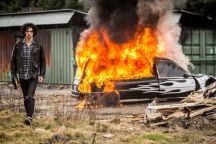 Drummer Gabriel (Dermot Murphy), recently diagnosed with bipolar disorder, is forced to curb his erratic behaviour when his therapist changes his medication and insists he join a special football team.
Drummer Gabriel (Dermot Murphy), recently diagnosed with bipolar disorder, is forced to curb his erratic behaviour when his therapist changes his medication and insists he join a special football team.
When he meets goalkeeper Christopher (Jacob McCarthy), a 17-year-old with Asperger’s Syndrome, a fraught relationship gradually develops into a firm friendship as each learns to respect the other’s foibles.
Writer/director/composer Nick Kelly captures the mental health pitfalls of a rock’n’roll lifestyle with sharp insight, while his portrait of a young man with Asperger’s, drawn with affection and deep understanding, is perfectly observed.
This uplifting and comedic feature début deservedly bagged the Best Irish First Feature Award
at this year’s Galway Film Fleadh.
IFI Notes [Sunniva O’Flynn]
92 min - Dir: Stephen Burke; Cinematographer: David Grennan with: Tom Vaughan-Lawlor, Niamh McGrady, Barry Ward, Martin McCann, Eileen Walsh
:: Guest Speaker: Producer Brendan Byrne on Skype, before the film
"You will be riveted to your seat in what is a refreshingly authentic film, which has not one false note." RTÉ (Ireland) [Paddy Kehoe]
"The least likely bits are all true. That counts as some sort of recommendation." Irish Times [Donald Clarke]
"What Maze does impressively is blend historical context with genre filmmaking, managing to feel both important and exciting." Film Ireland Magazine [Stephen Porzio]
It hardly needs to be said that a few unionist politicians have, before seeing the film,
already denounced Stephen Burke’s Maze as an insult to this and a misrepresentation of that.
 There are certainly dangers here. It is sometimes forgotten that a prison officer, stabbed during the Maze prison escape of 1983,
subsequently died of a heart attack. It was not just the brave lark of song and fable.
There are certainly dangers here. It is sometimes forgotten that a prison officer, stabbed during the Maze prison escape of 1983,
subsequently died of a heart attack. It was not just the brave lark of song and fable.
Working from his own tight script, Burke has taken a responsible approach to the material.
The core relationship is that between Larry Marley (Tom Vaughan-Lawlor), a thoughtful republican prisoner,
and Gordon Close (Barry Ward), a stressed guard.
 Marley is gaming Close to gain access to passwords and security loopholes, but, as the film progresses, he guiltily develops
a respect for him. We see Gordon defending his family from a terrorist attack on an everyday shopping expedition.
He ends up living in a sort of suburban cage. The subsequent violence from the screws is thus reasonably contextualised.
Marley is gaming Close to gain access to passwords and security loopholes, but, as the film progresses, he guiltily develops
a respect for him. We see Gordon defending his family from a terrorist attack on an everyday shopping expedition.
He ends up living in a sort of suburban cage. The subsequent violence from the screws is thus reasonably contextualised.
The picture is also sound on the legacy of the hunger strikes. Marley –
a genuine figure murdered by the UVF in 1987 – conceives the mass escape as a way of demonstrating that the movement remains unbowed.
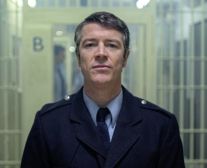 Meanwhile, he worries about his own son following in his footsteps. Nobody who knows anything about this sorry history
would deny that it swells with such personal contradictions.
Meanwhile, he worries about his own son following in his footsteps. Nobody who knows anything about this sorry history
would deny that it swells with such personal contradictions.
Here’s the surprise. Although the film-makers have dealt responsibility with the legacy, Maze
is at its best when most like John Sturges’s The Great Escape.
And it’s more like that film than we had any right to expect.
The tension is built up impressively. Vaughan-Lawlor combines raw commitment with a sneaky flexibility to give us an honest man who lies like a master. Ward works hard at allowing only hints of vulnerability to leak through his buffed Ulster carapace. Stephen Rennicks’s sinuous score Krautrocks us back to the early 1980s. Dave Grennan, a hugely experienced camera operator, brings damp menace to every shot of a depressed nation. Irish Times [Donald Clarke]






 Kevin Callahan spoke to our audience last year before the Bobby Sands movie. We`re delighted
to have him back with us to talk about Martin McGuinness and the events of this film.
Kevin Callahan spoke to our audience last year before the Bobby Sands movie. We`re delighted
to have him back with us to talk about Martin McGuinness and the events of this film.
 Peter Kirby knows conflict. As a lawyer, he has spent thirty years litigating disputes both in Canada and around the world.
As a writer of prize winning crime fiction, he explores the dark secrets that bring us to do violence to each other.
Peter Kirby knows conflict. As a lawyer, he has spent thirty years litigating disputes both in Canada and around the world.
As a writer of prize winning crime fiction, he explores the dark secrets that bring us to do violence to each other.
 The music we hear on Cardboard Gangsters was written and performed by
The music we hear on Cardboard Gangsters was written and performed by  Paul Vance has lived in Montreal since 2005.
Until 2001 he lived where he still calls home, Northern Ireland.
Paul Vance has lived in Montreal since 2005.
Until 2001 he lived where he still calls home, Northern Ireland.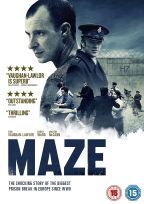 "You will be riveted to your seat in what is a refreshingly authentic film, which has not one false note."
"You will be riveted to your seat in what is a refreshingly authentic film, which has not one false note."
 click here!
click here!